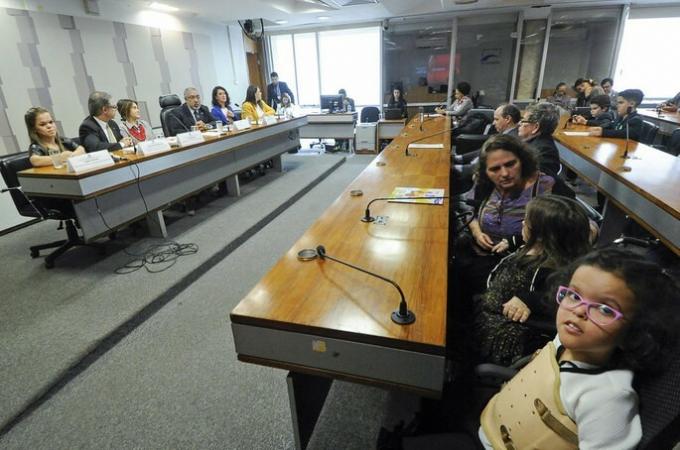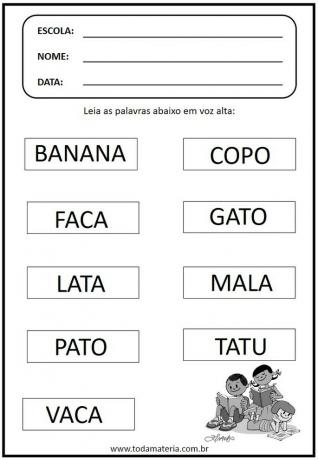I offer here some general tips on how the student should conduct themselves in student life, taking into account I found an attitude of freedom, but committed, in the face of the fascinating process of development personal.
1 - Stock the shelf
It is necessary to gather all the material. Although this is a consensus, what else exists is students "waving hands" in educational institutions, sometimes among those who, despite having conditions, resist acquiring the teaching material in the name of "other" contents that do not recommended. Not to mention those who think “just attend class”.
Negative! The material adopted is part of the teacher's work plan and should be seen as such. Disregarding this is not a good start.
2 - Take care of the order
It is good to divide the course materials by class chronology, theme or degree of difficulty. A student who attended my courses had three distinct spaces on her shelf, namely: easy subjects, moderately difficult subjects, and severely complex subjects.
As he would have to strive in the opposite order to that which he arranged his books, he kept at hand the contents considered complex, to which he paid extra attention.
According to her, “she even studied them in times of silliness”, taking advantage of the by-product of her daily time to “better get to know the enemy and defeat him in the battle of evaluations” to which she was submitted.
A neat organization is “a hand on the wheel”.
3 - Study everything
Making the weekly schedule of the contents you will study day after day gives rationality to school and academic work. If in one day the student prefers to break the order, that's fine. What doesn't matter is falling in love with some content and forgetting about the others. What is the use of specializing in subject “A” but not mastering subject “B” satisfactorily?
So it is necessary to conduct the studies in order to meet the requirements of all the knowledge of the course. If it is the case that you stop studying a subject, do not hesitate to put aside the one that has less weight in view of the institutional requirements, but without giving up to account for the knowledge required in the various evaluations of the course student.
4 - Make revisions
Studying the content once is not enough when the challenge is to master it completely and deeply. Therefore, it is important to review it as many times as necessary, without giving up. Review enables active assimilation and facilitates application.
This practice avoids unnecessary concerns and supports the ability to mobilize concepts and better qualify learning. Only the review consolidates the structuring of data and information that represent essential knowledge and knowledge for any undertaking in the order of “knowing”, “knowing how to do” and “knowing how to be”.
Reviewing is consolidating.
5 - Work balanced
A sign of common sense is to face the day-to-day of studies like a worker whose production has to happen, have quality and show up. But it is good to take care of the study environment, preferably lit by natural light, organized with sobriety, simplicity, good taste and, if possible, adequately equipped.
Also, provide a ten-minute break every fifty uninterrupted studies. The break is for the student to move, relax and regain new momentum in the workday. In those ten minutes, the brain processes everything that has been studied so that the learning will yield, and with greater quality, without causing fatigue.
6 - Generate summaries
Investing in the ability to produce well-made summaries of the studied content is a great reminder. However, synthesizing is not just listing content topics, but elaborating on paper a conceptual scheme similar to the mental map of the matter explored.
Once schematized, knowledge becomes a live stimulus for the brain to be “connected” to concepts, theories or explanatory systems in the stage of cognitive assimilation.
For this, the student can use everything that facilitates understanding in the syntheses: colors, words, geometric shapes, among other resources, that contribute to bringing the contents to memory investigated. To synthesize is to dominate.
7 - Remember your health
Don't overdo it. Eating properly and sleeping enough to replenish the expended strength. Eight hours of sleep a night is recommended by the medical staff.
In addition to eating and sleeping, try to enjoy fun and relaxation. Leisure well spent is another source of energy, as it invigorates the organism, lightens the head and airs the spirit.
The goal here is to avoid fatigue through walking, gymnastics, and other activities that make the body's energy flow naturally. So, the best thing is to eat, sleep and “move the skeleton”, continuing with fun, with the “oiled organism”, in shape.
8 - Self-motivate
It is essential to have reasons to study. They provide scope for harmonizing the acts of exploring content and taking steps to maintain personal strengths. One way to “bump in” with personal motives is to answer the following questions: “Why do I need to study?” "Why learn this and not something else?" “I want to study for???”
When thinking about these questions, the student takes out of his field of vision the "bar force" of others to consciously establish what he himself has to do with studies and where he recognizes himself in the choices he makes. in this context.
This is important because motivation doesn't come from outside. What exists is self-motivation, something personal and non-transferable.
9 - Solve problems
There are innumerable problems that can haunt the student on the student path, contributing to his attraction to discouragement. At this point, it's good to have a method for dealing with them. I propose the PADA System: Problem-Analysis-Decision-Action, whose steps are as follows.
First: identify and describe the problem, its causes and consequences.
Second: analyze it in light of the logic and feelings it provokes, characterizing the factors involved in it.
Third: mastering the causes, consequences and nature of the problem, decide for the most suitable solution to solve it.
Fourth: act to carry out the decision made and evaluate the actions taken in view of personal goals.
The habit of delaying, of “leaving it for later” ends up becoming a problem because it involves the vicious circle “I don't do it on time => I'm not up to date => I feel guilty”. The PADA system makes you overcome this type of problem and so many others that can arise during your student life.
10 - Outline strategies and tactics
If the strategy is related to the global action plan, as it foresees large study operations, the tactic refers to intermediate acts. Strategy example: mastering philosophical knowledge contents.
Example tactics: “studying” the history of philosophy, “deeping” into a current of philosophical thought, and achieving “specialization” in a particular philosopher within it.
However, if the apprentice considers that it did not go well in one of these moments, the indication is to relax, calmly and serenely, because “losing a battle does not mean losing the war”. The important thing is the robust “I want to learn!”, the capital resolute decision.
Conclusion
These reminders serve the overview of what you want to learn (course), also seeing the parts (discipline, content), without extremism to one side or the other.
Question: Can we really see the whole room when we put our noses against the wall? And, from the top of the mountain, do we see the sparrow that lands on the branch there on the slope?
Well then! Do all of this in a planned way because planning reconciles the “whole” and the “part” in a curriculum. But beware: a program is a map, not a territory. It only guides the exploration of the lands it represents.
So too the curriculum: it must be designed to guide learning activities, without the blindness of the wall or mountaintop.
Do not stop now... There's more after the advertising ;)
Per Wilson Correia
Columnist Brazil School
education - Brazil School



